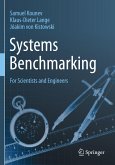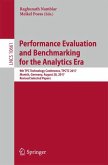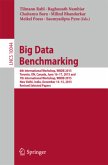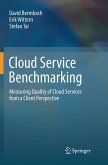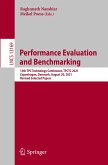This book serves as both a textbook and handbook on the benchmarking of systems and components used as building blocks of modern information and communication technology applications. It provides theoretical and practical foundations as well as an in-depth exploration of modern benchmarks and benchmark development.
The book is divided into two parts: foundations and applications. The first part introduces the foundations of benchmarking as a discipline, covering the three fundamental elements of each benchmarking approach: metrics, workloads, and measurement methodology. The second part focuses on different application areas, presenting contributions in specific fields of benchmark development. These contributions address the unique challenges that arise in the conception and development of benchmarks for specific systems or subsystems, and demonstrate how the foundations and concepts in the first part of the book are being used in existing benchmarks. Further, the book presents a number of concrete applications and case studies based on input from leading benchmark developers from consortia such as the Standard Performance Evaluation Corporation (SPEC) and the Transaction Processing Performance Council (TPC).
Providing both practical and theoretical foundations, as well as a detailed discussion of modern benchmarks and their development, the book is intended as a handbook for professionals and researchers working in areas related to benchmarking. It offers an up-to-date point of reference for existing work as well as latest results, research challenges, and future research directions. It also can be used as a textbook for graduate and postgraduate students studying any of the many subjects related to benchmarking. While readers are assumed to be familiar with the principles and practices of computer science, as well as software and systems engineering, no specific expertise in any subfield of these disciplines isrequired.
The book is divided into two parts: foundations and applications. The first part introduces the foundations of benchmarking as a discipline, covering the three fundamental elements of each benchmarking approach: metrics, workloads, and measurement methodology. The second part focuses on different application areas, presenting contributions in specific fields of benchmark development. These contributions address the unique challenges that arise in the conception and development of benchmarks for specific systems or subsystems, and demonstrate how the foundations and concepts in the first part of the book are being used in existing benchmarks. Further, the book presents a number of concrete applications and case studies based on input from leading benchmark developers from consortia such as the Standard Performance Evaluation Corporation (SPEC) and the Transaction Processing Performance Council (TPC).
Providing both practical and theoretical foundations, as well as a detailed discussion of modern benchmarks and their development, the book is intended as a handbook for professionals and researchers working in areas related to benchmarking. It offers an up-to-date point of reference for existing work as well as latest results, research challenges, and future research directions. It also can be used as a textbook for graduate and postgraduate students studying any of the many subjects related to benchmarking. While readers are assumed to be familiar with the principles and practices of computer science, as well as software and systems engineering, no specific expertise in any subfield of these disciplines isrequired.


